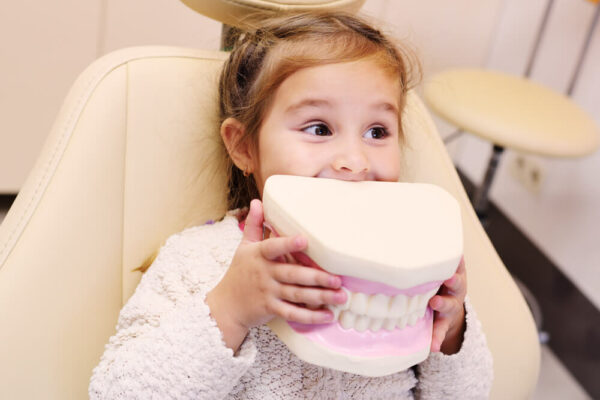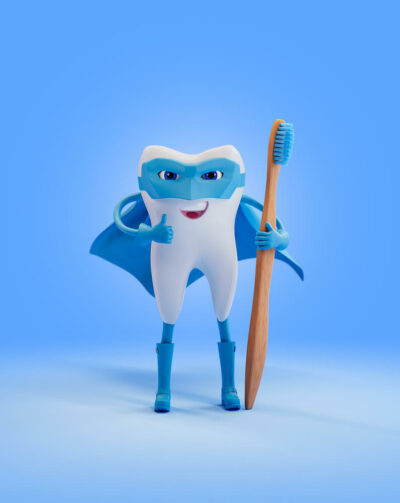Afraid of the dentist? You’re not alone!

If you struggle with routine trips to the dentist, you’re in good company: It’s estimated that more than a third of adults have some dental-related anxiety. More than 10 percent of that group are plagued by what can be classified as extreme dental fear or dentophobia. Dentophobia — the fear of dentists and associated dental procedures — is a devastating but common phobia that can keep sufferers from getting the dental care they need.
Here at Dr. Lance Johnson Family Dentistry, we want you to know the good news: There are ways to manage dental anxiety so your oral health and quality of life don’t suffer.
What are the ramifications of dentophobia?

We live in a country that prizes a shiny, perfectly white smile, and there’s a tremendous social stigma for those with missing or decayed
teeth. Dental anxiety or fear can keep sufferers from getting the care they need so that minor dental problems (like a cavity) quickly turn into larger ones (losing a tooth after decay or gum disease progresses).
The embarrassment of an unsightly mouth or bad breath can, in turn, increase resistance to visiting the dentist. People living with Dentophobia also frequently experience social anxiety, depression, and isolation. Even worse, a tooth infection can have systemic consequences, putting the whole body at risk of sepsis or heart disease.
Where does dental fear come from?
Those with dental anxiety frequently don’t know why they’re scared; they just know they are, making it difficult to make and keep dental appointments. As with any phobia, it can be difficult to pinpoint where and when the distress originated. Dental anxiety sufferers experience trepidation due to different elements of the dental experience, depending on the person. Most sufferers report a combination of fears and causes, including but not limited to:
- Fear of pain
- Fear of needles
- Fear of feeling held down
- Fear of clinical smells, such as sterilizing agents
- Fear of dental sounds, such as drilling, or metal tools scraping teeth
- Fear of visuals at the dentist office, such as the drill or dental chair
- Fear of numbness
- Fear of choking or gagging
- Fear of the dentist as a sadistic figure
- Bad dental experiences in childhood
- PTSD from being the victim of a crime or assault
How do you reduce symptoms of dentophobia or dental anxiety?
The good news is that there are many ways to address extreme fear of dental procedures. Both mildly and severely dentophobic people can benefit significantly from consultation with a mental health professional. In addition to prescribing anti-anxiety medications for dental visits and procedures, mental health professionals can offer hypnosis sessions and cognitive-behavioral therapy to alleviate intense fear responses.
Can dentistry really be pain-free?
Yes! Completely pain-free dental work is a relatively new and remarkable development in dentistry. Many people are still skeptical that dentistry can be made comfortable, but it absolutely can. There are several methods to pain-free dentistry, including the following:
Local anesthetic:
If the dental care required is not extensive, local anesthetic agents can work wonders. Your dentist can first use cream or gel topical anesthetic to numb the gum or cheek, then inject a local anesthetic into the treatment region. This approach is very common when filling cavities or prepping teeth for crowns.
Nitrous oxide:
Often referred to as “laughing gas,” nitrous oxide is given to the patient via a small plastic mask. As a result, patients can expect to feel extremely relaxed but not lose consciousness during their dental work.
Oral sedation:
This method is also called “conscious sedation.” Sedatives, like Xanax, in pill form are another option for anxious patients if there are no contraindications. Bonus: No needles needed to administer! They take a little while to take effect, but depending on the dose, may even cause the patient to have no memory or very little memory of the dental procedure, which is desirable to many people with dental anxiety.
IV sedation:
For more acute cases of dentophobia, IV sedation is often necessary, as it allows for a deeper level of relaxation. The patient is given an IV, through which the dentist injects sedatives. This is often called “twilight sleep,” as the patient may not be fully aware of their surroundings or the procedure and is sometimes used for multiple extractions, such as wisdom teeth. With IV sedation, the patient may need to stay in the chair for some time after the dental work is completed for monitoring as they awaken fully. This option requires a loved one present to drive the patient home in case of lingering drowsy effects.
General anesthesia:
A trained anesthetist will administer IV meds to make the patient unconscious for the dental procedure. The patient is monitored closely throughout, and no memory of the procedure will occur.
Should I talk to my dentist about my fear?
Absolutely. The first step with any dental fear is finding a dentist you trust and communicate well with. Your dentist wants to know everything they can about you and your dental anxiety. They can help you face your fears and put you at ease. No-dental-work consultations prior to exams and procedures are also a helpful strategy to discuss the upcoming dental work and your concerns.
Many dentists help anxious patients during procedures by using the “tell, show, do” approach: first explaining what they’re going to do, then showing you their tools before treatment.
Relaxation techniques such as meditation and deep breathing can also do wonders to ease anxiety. Many dentists also strive to create a serene atmosphere with pleasant music and low lighting.
You’re in Great Hands at Dr. Lance Johnson Family Dentistry
We empathize with our anxious patients — and we understand how challenging dental fear can be. You can trust that we welcome all your worries and concerns, and we’re here to make your dental experience as comfortable and positive as possible. You might even start to like it here! So take that first step and connect with us — we’ll help you create a path to better oral health that you feel good about, we promise.





